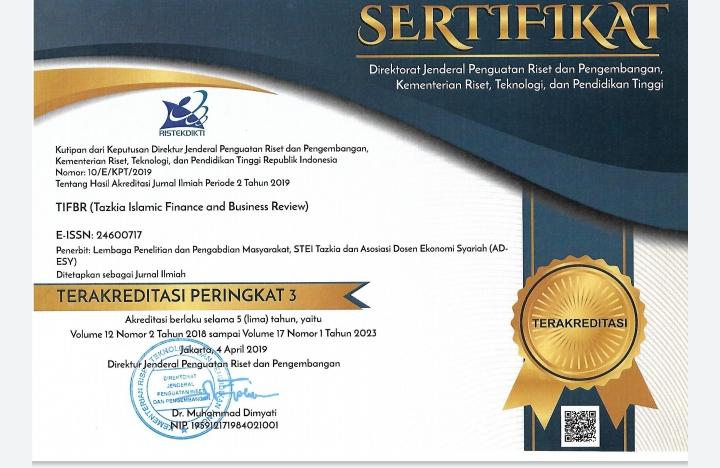Implementation of Auditing in Zakat Institutions: Case studies of BAZNAS Riau and Pekanbaru
DOI:
https://doi.org/10.30993/tifbr.v12i2.133Keywords:
Zakat institutions, Internal audit, sharia audit, financial auditAbstract
This paper examines the implementation of auditing in Zakat Institutions with a case study in BAZNAS Riau Province and BAZNAS Pekanbaru. Nowadays, the government and citizen’s attention for zakat management has become so high. Therefore, there are publications of rules about the obligation of zakat Institutions to make the report which, then, is an object to be audited. The researcher interviewed some regarding this topic, such as the Commisioner Head and Manager of BAZNAS Riau province and BAZNAS Pekanbaru and some staff of the Ministry of Religion who are in charge of zakat. The findings show the high attention of important role of internal auditor in zakat institutions. In the case at BAZNAS Pekanbaru, a team of internal auditors has been formed in 2017. The internal auditing activities can be the starting point for the external auditing activity. External auditing in zakat institutions industry facing many challenges such as waiting the release of technical rules of sharia audit from Ministry of Religious Affairs. The paper contributes to the better governance for zakat institutions to increase the trust of moslems especially muzakki in Riau province.
References
Adnan, M. A. and Bakar, N. B. A. (2009). Accounting Treatment for Corporate Zakat: a Critical Review. International Journal of Islamic and Middle Eastern Finance and Management, Vol. 2 (1): 32-45.
Alexakis, C., and Tsikouras, A. (2009). Islamic Finance : Regulatory Framework-Challenges Lying Ahead. International Journal of Islamic and Middle Eastern Finance and Management, Vol. 2 (2): 90-104.
Beik, et al. (2014). Towards an Establishment of an Efficient and Sound
Zakat System. Presented in the Working Group of Zakat Core Principles.
Daniela, P. and Attila, T. (2013). Internal Audit Versus Internal Control and Coaching. Procedia Economis and Finance, Vol. 6: 694-702.
Embong, M. R., Taha, R., and Nor, M. N. M. (2013). Role of Zakat to Eradicate Poverty in Malaysia. Jurnal Pengurusan, Vol. 39: 141-150.
Firdaus, M. et al. (2012). Economic Estimation and Determination of Zakat Potential in Indonesia. IRTI Working Paper Series 1433-07.
Gusfahmi. (2007). Pajak Menurut Syariah. Jakarta: PT. Raja Grafindo Persada.
Hafidhuddin D. (2011). Peran Strategis Organisasi Zakat dalam Menguatkan Zakat di Dunia. Jurnal Al infaq, Vol. 2 (1): 1-4
Hayeeharasah, F., Sehvises, S., and Ropha, H. (2013). The Timeline of Zakah. Procedia Social and Behavioral Sciences: 2-7.
Ji, X., Lu, L., and Qu, W. (2017). Voluntary Disclosure of Internal Control Weakness and Earning Quality : Evidence from China. The International Journal of Accounting, Vol. 52(1): 27-44.
Khalifa, H., Alkdai, H., and Hanefah, M.M. (2012). Audit Committe Characteristic and Earnings Management in Malaysian Sharia-compliant Companies. Business and Management Review: 52-61.
Kementerian Agama RI Direktorat Jenderal Bimbingan Masyarakat Islam. (2012). Panduan Organisasi Pengelola Zakat. Jakarta: Kementerian Agama RI.
Mahzan, N. and Yan, C. M. (2014). Harnessing the Benefits of Corporate Governance and Internal Audit : Advice to SME. Procedia-Social Behavioral sciences, Vol. 115: 156-165.
Megawati, D., and Trisnawati, F. (2015). Penerapan PSAK 109 tentang Akuntansi Zakat dan Infak/Sedekah pada BAZNAS Pekanbaru. Kutubkhanah, Vol. 17 (1): 40-59.
Munteanu, V. and Zaharia, D. L. (2014). Current Trends in Internal Audit. Procedia-Social and Behavioral Sciences, Vol. 116: 2239-2242.
Naz'aina. (2015). The Effect of Internal Control System and Amil Competence on the Financial Quality at Zakat Management Institution Active Member of Zakat Forum in Special Capital City Region Jakarta and West Java Provinces. Procedia- Social Behavioral Sciences: 753-760.
Nurzaman, M. S. (2010). Zakat and Human Development: An Empirical Analysis on Poverty Alleviation in Jakarta, Indonesia. Presented on 8th International Conference on Islamic Economics and Finance.
Qardawi, Y. (2004). Hukum Zakat. Pustaka Litera Antar Nusa.
Saad, R. A. S., Aziz, N. M. A., and Sawandi, N. (2014). Islamic Accountability Framework in the Zakat Funds Management. Procedia Social and Behavioral Sciences, Vol. 164: 508 – 515.
Wahab, N. A. and Rahman A. R. A. (2011). A Framework to Analyse the Efficiency and Governance of Zakat Institutions. Journal of Islamic Accounting and Business Research, Vol. 2(1): 43-62.
Yaacob, H. (2012). Issues and Challenges of Shari'ah Audit in islamic Financial Institutions: A Contemporary View. Presented on 3rd International Conference on Business and Economic Research. Bandung, Indonesia: 2669-2676.
Yusoff, M.B., and Densumite, S. (2012). Zakat Distribution and Growth in The Federal Territory of Malaysia. Jurnal of Economic and Behavioral Studies, Vol. 4 (8): 449-456.
Downloads
Published
How to Cite
Issue
Section
License

Tazkia Islamic Finance and Business Review (TIFBR) is licensed under a Creative Commons Attribution-NonCommercial 4.0 International License.
Authors who publish with this journal agree to the following terms:
- Authors retain copyright and grant the journal right of first publication with the work simultaneously licensed under a Creative Commons Attribution License that allows others to share the work with an acknowledgment of the work's authorship and initial publication in this journal.
- Authors are able to enter into separate, additional contractual arrangements for the non-exclusive distribution of the journal's published version of the work (e.g., post it to an institutional repository or publish it in a book), with an acknowledgment of its initial publication in this journal.
- Authors are permitted and encouraged to post their work online (e.g., in institutional repositories or on their website), as it can lead to productive exchanges, as well as earlier and greater citation of published work (See the Effect of Open Access).
















